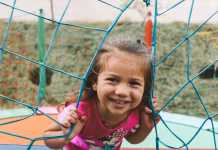This week is Chromosome Disorder Awareness Week, meaning it’s the perfect time to tell you what I know about raising a child with a chromosomal abnormality. In this article, I’ll answer the most common questions I get about my prenatal, birth, and motherhood experiences raising a child with 21q Partial Deletion.
1. Did you know about your son’s diagnosis before he was born?
Yes, and no. We saw kidney cysts on an ultrasound during pregnancy, as well as thickened heart tissue. We knew he would be a NICU baby regardless of how he was delivered. I was followed closely by high-risk OBGYNs, Pediatric Cardiologists, and Nephrologists. The underlying diagnosis of 21q Partial Deletion wasn’t discovered until his genetic workup in the NICU.
2. What is 21q Partial Deletion?
21q Partial Deletion is my son’s chromosomal abnormality. It’s literally a piece of missing genetic material (a partial deletion) on the 21st chromosome. Most people are more familiar with Trisomy 21, or Down Syndrome. This is when there are 3 copies of the 21st chromosome. What my son has is kind of the opposite.
Here’s my favorite analogy: Imagine you’re reading a book. You’re on chapter 21, and a few pages are ripped out. Depending on which pages, and how many of those pages are missing, the story is either minimally or greatly affected. The “missing pages” are the exact coordinates of the missing chromosome. Yes, they can determine the exact breakpoints, or “address,” of the deletion. Science is pretty cool.
3. How many people have 21q Partial Deletion?
Good question. Short answer: approximately 60 diagnosed cases, with only ONE other case of the exact same deletion (“missing pages”) as my son’s. They have different symptoms. Genes are strange like that. They can turn “on” and “off,” and neighboring genes can compensate for missing ones. Two people can have the exact same missing genetic material and live very different lives.
It’s also worth noting that the type of genetic testing available is pretty new and has probably advanced since my son was born just four years ago. More cases are being diagnosed every day, and many people may have probably had the deletion but never received the diagnosis.
4. What are the symptoms of 21q Partial Deletion?
Well, as I mentioned in question 3, it varies from person to person. In our case, my son has a hole in his heart (Atrial Septal Defect), abnormal kidneys, high blood pressure, a g-tube, global delays, hypotonia (high muscle tone, or tight muscles), brain abnormalities, and small airways — to name a few. This all sounds really complex, and it is, but at this point, it feels very normal. Our lives consist of lots of appointments and medical equipment, but honestly, my son’s differences aren’t really a “thing” to us until we go out in public. My son is generally very happy, loves bathing and swimming, reading books, listening to music, and Disney Jr.’s “Tots.” He just started crawling a few weeks ago! He makes progress on his own time and is very social although COVID-19 has kept us isolated.
5. What will your son’s future look like?
Don’t know! Most of the individuals who are diagnosed are children, so there’s literally no research on adults with 21q partial deletion. He may live with us forever, he may live independently, or he may live in some sort of adult assistive community. Only time will tell. It was hard to wrap my head around that at first, but I’m at peace with it now. Raising a child with chronic illness and a rare diagnosis teaches you a lot of life lessons really fast. I’ve learned to be at peace with the unknown, love hard every day, and follow my son’s lead. I’ve learned to say “screw it” to societal norms, and focus on giving my son the best life I can. I’ve seen the world through a new lens, and I can never go back. We’ve also lost a lot of children with the same diagnosis — and that’s so sad, and scary as hell. But, I’ve learned to enjoy every moment, and I just feel honored to be my son’s mother. No matter what happens, I will be the lucky one for having him in my life.
6. My child has just been diagnosed with a chromosomal abnormality. Now what?
Buckle up! It’s a bumpy ride. Let yourself feel all the things–grief, sadness, fear…maybe even the relief of finally getting a diagnosis. Reach out to people you trust to lean on. Find support wherever you can, and take care of yourself. Vocalize your needs very clearly to your partner, family, friends, doctors, therapists, etc. Learn to advocate for your child in a way that respects their privacy and encourages actual change. Learn everything you can about your child’s diagnosis. Start looking into resources — ask your case manager or social worker for references. Here are some of my recommendations for resources:
- Families Helping Families
- Little Lobbyists
- LA Department of Health
- LA Medicaid
- Special Needs Moms Facebook Groups
- Disability Rights Center of LA
- LA CAN
- Global Genes
- Too Peas in a Podcast
- Special (the book)
- Wyndy (a babysitter app)
- Local Nursing schools – reach out to see if any students are willing to help with caregiving responsibilities.
As you can see, a lot of the burden will fall on you, the caregiver. It’s a lot of work, and if a partner is involved in your situation, get them involved in helping you. I suggest making binders of medical history, any testing that’s been done, surgeries and procedures, schedules, and the names and numbers of everyone on your care team. I also include hypothetical emergency scenarios and protocols in my son’s binder. (This binder could be a blog post all on its own!)
7. You seem like you have it all together. How do you do it?
I’ve had some really low lows, and dark bouts of anxiety and depression — not to mention PTSD for over a year after our NICU stay. I’m blessed and lucky to say I feel like I’m on the other side of all that now. I’ve had to do a lot of self-reflection, boundary setting, therapy, and finding coping skills that actually work to get here. (P.S. Retail therapy, spa treatments, and wine may offer temporary relief, but they are NOT sustainable coping skills. They only drain your wallet and widen your waistline.)
If you’re feeling overwhelmed, I see you, I hear you. I’ve been you. Reach out to me in the comments section, on social media (I’m on FB and IG), or through my website. It takes a village, and I’m more than happy to be a part of yours.

















Thank you for sharing information about your son. Our 5 year old daughter was recently diagnosed with a partial q21 deletion. She has a a 5.63MB deletion on 21-22.2Q22.3. It’s been a long and emotional journey but we have finally found some answers. Well, sort of. There’s not a lot of information on this deletion so I’m trying to piece it all together so that I can advocate for our daughter and find the help she needs. Unfortunately, where we live, she is the first and only case they have seen. So, although we have a diagnosis, we are having to learn about this deletion together, with her specialists.
Again, thank you for sharing your story. It helps to know we’re not completely alone on this journey!
Hi Genelle, I’m so glad you reached out. There is a facebook group with the parents of 21q kids from all around the world. It is hosted by Sarah Moody. We are getting new members all the time. It is private, so your information is safe, but I’ve learned SO much from this group, and the doctors always appreciate the input I give them. Please find me or Sarah Moody on facebook so she can “friend” you and let you into the group. I promise you’ll learn more here than from the clinical research that is available.
Best, Cristina
Thank you. I teach 8th grade and have a lovely, young boy in my class with partial deletion of Chromosome 21. I am trying to learn as much as I can about this abnormality. Thank you, again.